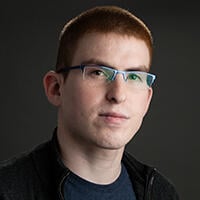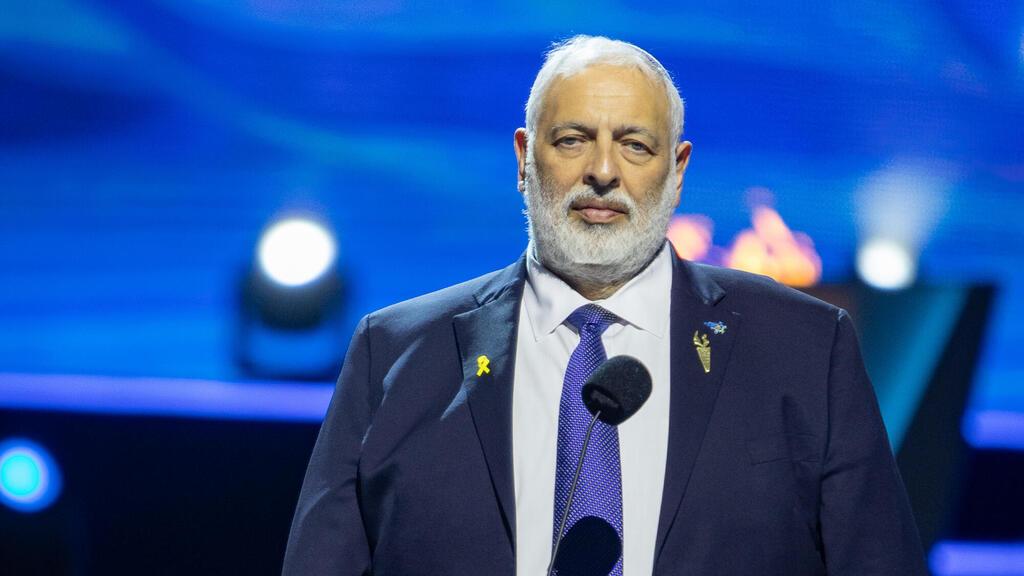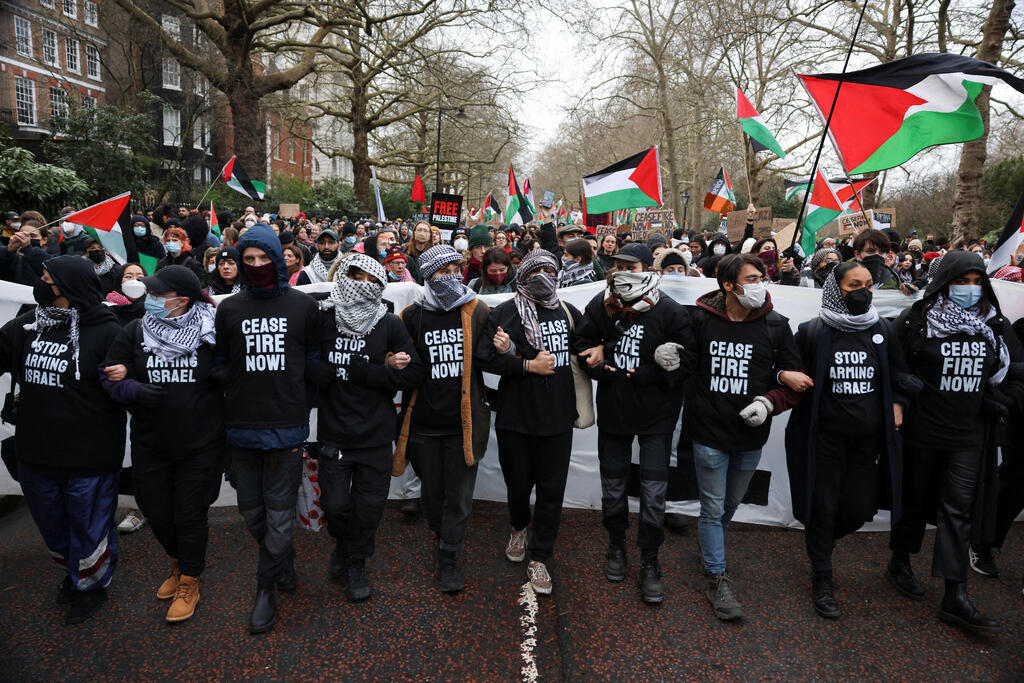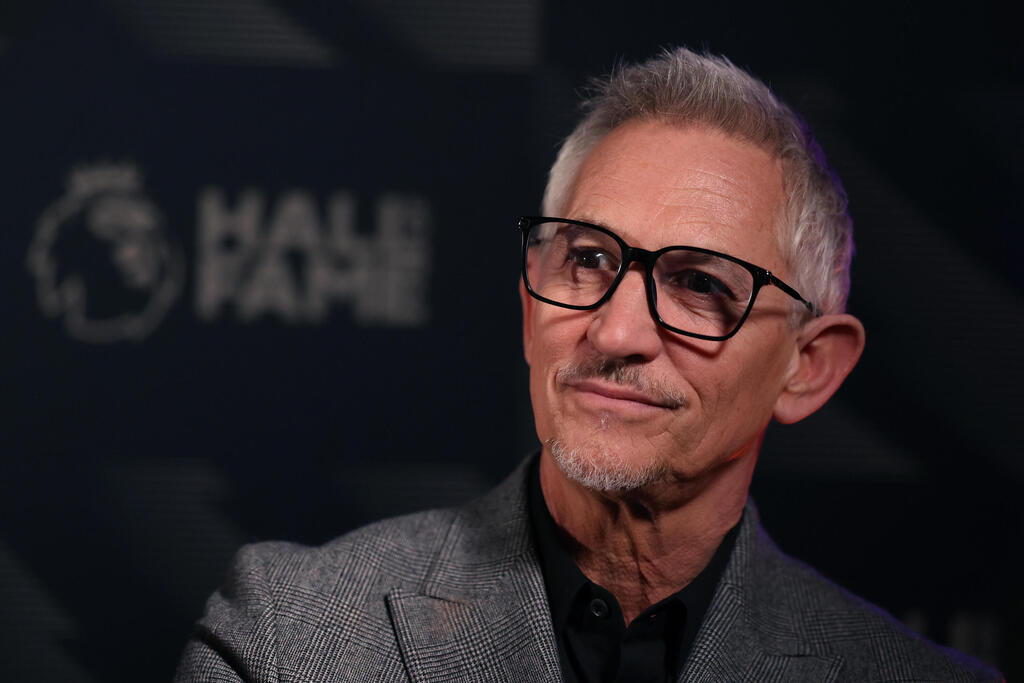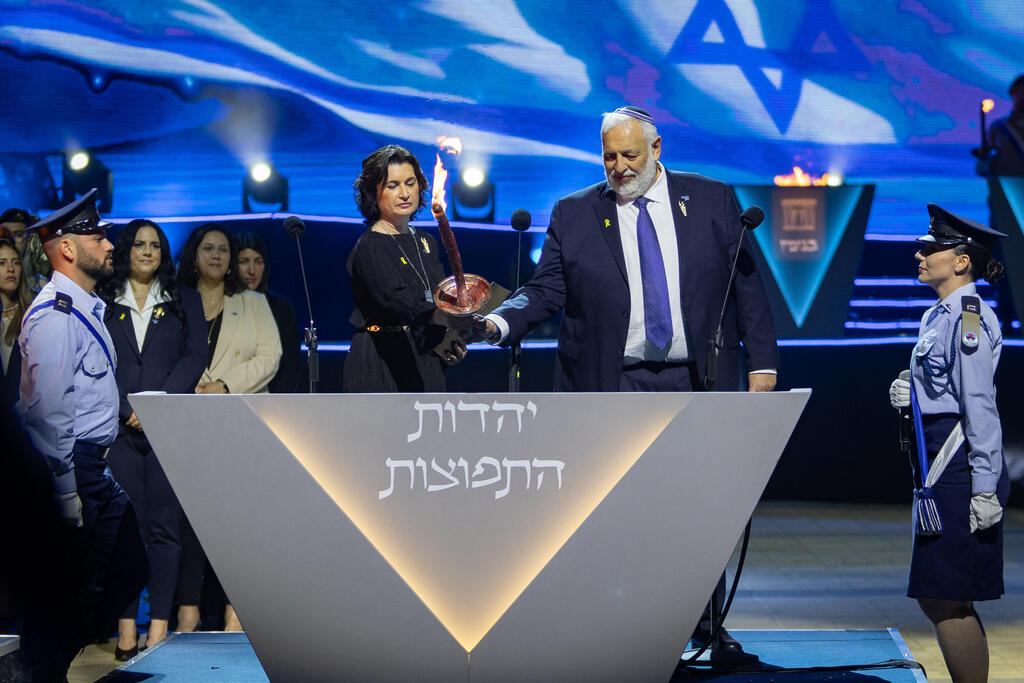Getting your Trinity Audio player ready...
Rabbi David Meyer has witnessed and personally experienced the surge in anti-Israel sentiment on the streets of London since the outbreak of the war in Israel. Initially, there were voices of support, but the negative trend has worsened over time.
"When I traveled on the train a few days after October 7, people approached me, saying what happened was wrong and that they stood with us. Now, in the city center, it's almost impossible to walk around visibly Jewish without someone shouting at me. It has happened several times," he told Ynet.
What do they shout?
"'Jew,' 'genocide,' all sorts of things... I don't listen, I don't care. But it's clear that it's happening. We've reached a point where I think it's dangerous to walk around with a kippah or a Star of David in certain places."
Do you still walk around with a kippah and Jewish attire?
"Usually, yes, and obviously in the Jewish area of London where I live, there are no issues. But when I traveled to Manchester, I wore a hat that covered my kippah. In central London, I do wear a kippah, but it feels uncomfortable. I think there isn't a single Jew here who hasn't wondered if we're witnessing the end of the Jewish community in England."
Meyer is the CEO of PaJeS (Partnerships for Jewish Schools), which encompasses many Jewish schools in England. In 2020, he was awarded the Order of the British Empire for his contributions to education. Recently, he had the honor of lighting the Diaspora torch at the Independence Day ceremony in Israel, alongside Deborah Silverstein, a Chicago City Council member.
"The truth is, when I was asked to light a torch, I didn't really know what it was, because I had never watched the ceremony," admits Rabbi Meyer. "When I was in Israel, I was standing in a store with my wife, and people asked if I was the one who lit the torch. They wanted to talk to me and take pictures.
"I didn't think people in England would watch the ceremony, but I believe that this year, with everyone feeling so close to Israel, many people did. I received a lot of feedback. Someone came up to me and said, 'Well done, I think it's very important.' But there was also a Jewish woman from the community who asked why I did it, saying she wasn't sure if it was a good idea, as it might be dangerous and cause trouble."
'Not even Brexit provoked such demonstrations'
Rabbi Meyer works closely with UnitEd, an organization that collaborates with the Diaspora Affairs Ministry to support Jewish schools worldwide, aiming to strengthen students' Jewish identity and their connection to the local community and Israel. UnitEd offers school leaders and educational teams around the world services such as updated educational content, teacher recruitment and training, learning communities and more.
"We've reached a point where I think it's dangerous to walk around with a kippah or a Star of David in certain places… When I traveled to Manchester, I wore a hat that covered my kippah. In central London, I do wear a kippah, but it feels uncomfortable."
Following the outbreak of the war, a strategic growth project for 30 schools in England was launched in London, a collaboration between UnitEd, the chief rabbi of England, PaJeS and United Synagogue.
When Meyer visited the Knesset, he shared his perspective on the State of Israel and the Jewish Diaspora with Prime Minister Benjamin Netanyahu. "I told him that I believe we are fighting three wars right now. The first war is Israel's fight against Hamas and Hezbollah. The second war is in the Diaspora, against antisemitism, and I think it's a completely different battle. The third war is for our Jewish identity, especially that of our children. Netanyahu agreed with me and said it was very true.
"Some people see what's happening in Israel and feel closer to their faith, but others don't want to know or think, 'Why do I need this problem? I don't want to associate myself with Judaism if it brings all this antisemitism upon me.' I educate children to feel proud of their Jewish identity while also addressing the antisemitism they experience. I don't want people to start taking pride in their Judaism only because of something negative like October 7."
Alongside strengthening Jewish identity among young people in the community, Meyer has helped many Israelis who came to England during the war. "Many Israelis who were abroad during Sukkot came to us following the October 7 attack, which happened during the Simchat Torah holiday. Some families didn't want to return to Israel because of the situation and the war," he explains.
"These aren't people who don't care about what's happening or who ran away. For example, there's one who serves in the paratroopers reserves. He brought his wife and daughter to England, sent his daughter to school here, so he could return to Israel and fight. There are also many Israelis, who were evacuated from the north and south, who came to England. One child who arrived at school asked his teacher, 'Where is the bomb shelter?' It's a question that isn't part of our usual vocabulary. We helped the school integrate the children, and there were psychologists ready to assist if needed."
How does it feel to be visibly Jewish in England today?
"Just as people ask me what it's like to live in Israel, where it's so dangerous with rockets coming at any moment – it's not as bad as people think. Things happen, but it's not constant. Still, one can say that England has changed completely since October 7. My parents came from India to England in the 1950s. We felt like part of the English community. I could be Jewish, religious, Zionist – and also part of English society. Now, it feels different. There are ignorant people shouting every week, from October until now. There hasn't been anything in England that people felt strongly enough about to protest like this. Not even Brexit (Britain's exit from the European Union) provoked such demonstrations."
The silent majority
Rabbi Meyer emphasizes that not everyone in England opposes Israel. "Prime Minister Rishi Sunak and opposition leader Keir Starmer are very supportive of Jews and strongly stand with the community," he notes. "I believe most people in England don't agree with the protesters. The problem is the silence. People aren't speaking up and saying it's wrong."
In his view, there is no doubt that the massive pro-Palestinian protests are tainted with antisemitism. "Protesters in the streets claim it’s not antisemitism but anti-Zionism. They’ve found chants that the police allow them to say, but all Jews know this is antisemitism, a step above anti-Zionism," he says.
"When they shout 'From the river to the sea, Palestine will be free' or 'Intifada now,' and when they destroy posters of hostages, it’s not because of Israel. They can shout at an anti-Zionist Orthodox Jew just as they shout at me. To them, there’s no difference. It doesn’t mean everyone there is antisemitic, but I think it’s very hard to distinguish who has crossed the line and who hasn’t."
Do you think the UK should outlaw chants like 'From the river to the sea' and 'Intifada'?
"That’s a good question. I think it’s very hard for the government and the police to handle this. We have very good cooperation with the police; cops secure all Jewish schools and synagogues here in England. But when a hundred thousand people are shouting 'Intifada,' they know it’s impossible to stop them. Every time they’re told not to do it, they’ll just do it more.
"There are people there who understand the situation and know exactly what they’re saying, but most do not. They don’t know or understand how complex the situation is in the Middle East. They call for a 'cease-fire now' without caring about the hostages or the situation in Israel. They think it’s an 'apartheid state,' but we know that’s not true. They say Israelis are committing 'genocide,' but when Iran sends hundreds of missiles and drones to Israel, isn’t that an attempt at genocide? And when Hamas wants to kill all Jews, and says repeatedly that’s what they want to do? This is not anti-Zionism; this is antisemitism."
As an example of public figures adopting anti-Israel positions, he mentions the famous former soccer player and current commentator Gary Lineker. "Gary Lineker speaks against what Israel is doing. He understands nothing – but suddenly everyone listens to him, and what he says becomes important," he says. "Young people are taking ideas from TikTok without truly understanding the situation. We’ve reached a very dangerous and complicated point."
Thoughts on making Aliyah in your family?
"Yes, my wife is very eager. She's ready to go tomorrow. Yesterday, even. My work is here, so it's not so easy. We have five children, two of whom are married, and I have two granddaughters. Each one has their own story. My youngest daughter, Rivki, is currently studying at a seminary in Israel and will stay for another year for National Service. I spoke to her on the phone when she was at the Tel Aviv train station, on her way to Jerusalem, and there were sirens. Suddenly, I heard two loud explosions through the phone, and she started crying. Someone beside her calmed her down, saying it was an Iron Dome interception. Despite everything, my daughter chose to stay in Israel. She is a Zionist, and she and her friends don't want to return to England and study there with such antisemitism."
'The heart of the Jews will always be in Israel'
His views on making Aliyah have evolved over the years. "I studied at a yeshiva in Israel in the past, and when I returned to England, I wanted to make Aliyah, but it didn’t happen. I once thought that eventually all Jews must live in Israel," he recalls. "Today, I don't think that way. I believe there will be communities in several places around the world, and the Diaspora is very important, but the heart of the Jews will always be in Israel."
What were your impressions of the other torchbearers when you met in Israel?
"The truth is, when I arrived and met the real heroes who lit the other torches, I felt like a drop in the ocean compared to them. These are such important people. I met someone from the Mossad, Rami Davidian, who saved hundreds of people on October 7, members of ZAK, and others... Each one did something great. I felt it was unfair that I was there, knowing people who have done much more than I have. Everyone told me the same thing, that there is a place for everyone and that it’s very important that I am there. I think the Jewish people are like a puzzle, and even if my piece is very small, we in the Diaspora are part of Israel's story."
Since he doesn't live in Israel, Meyer avoids directly criticizing the Israeli government’s policies and doesn’t complain about the torch-lighting ceremony being held without an audience. "I visited Israel in August. Everyone I met wanted me to tell them exactly where I stood on the judicial reform. I think that if I don’t have an Israeli passport, I have nothing to say," he says. "It wasn’t comfortable, but everyone wanted to hear what I had to say, and there were two camps within one people. After October 7, the situation was entirely different, but I’ve visited Israel five times since, and slowly I see it returning to that state."
If there is one message he wants to convey to the Israeli public, it is about unity and avoiding division. "I met people during the filming of the torch-lighting ceremony, and there was a strong feeling that we are one people," he concludes. "There were religious and secular people, Jews and Arabs – everyone stood together. We have the ability to work together, even if we have opposing views."



